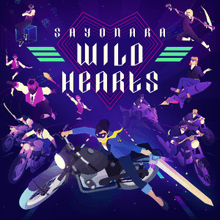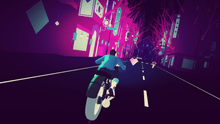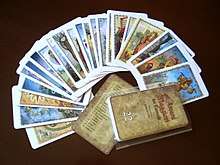Sayonara Wild Hearts
Sayonara Wild Hearts is a music-based action game created by Swedish developer Simogo and published by Annapurna Interactive. Described as a "pop album video game", Sayonara Wild Hearts follows the story of a heartbroken young woman through a surrealistic landscape. Each level of the game is set to a song, with the player guiding the woman while collecting hearts, avoiding obstacles, and fighting enemies. The game was released for PlayStation 4, Nintendo Switch, macOS and iOS devices in September 2019, for Microsoft Windows in December 2019, and for Xbox One in February 2020. It was met with positive reviews for its visuals, soundtrack, and gameplay, and nominated for several year-end awards.
| Sayonara Wild Hearts | |
|---|---|
 | |
| Developer(s) | Simogo |
| Publisher(s) | Annapurna Interactive |
| Director(s) | Simon Flesser |
| Programmer(s) | Magnus "Gordon" Gardebäck |
| Artist(s) | Carl Karjalainen, Ása Wallander |
| Composer(s) | Daniel Olsén, Jonathan Eng |
| Engine | Unity |
| Platform(s) | PlayStation 4, Nintendo Switch, macOS, iOS, Microsoft Windows, Xbox One |
| Release |
|
| Genre(s) | Rhythm, action |
| Mode(s) | Single-player |
Gameplay

Sayonara Wild Hearts is a rhythm game broken into 23 levels. In each level, the player controls the main character as they automatically travel through a surrealistic landscape alongside a pop music soundtrack. The general mechanics of each level change, but in general the player attempts to guide the character to collect hearts across the level to each points, while avoiding obstacles. In some levels, the player will be prompted to press a button in time with the soundtrack to make a jump or avoid an obstacle. Other levels may require the player to move a cursor on screen to target a bow-and-arrow weapon to defeat enemies, in a manner similar to Rez.[1] During the levels, the player will encounter different boss encounters, which will incorporate a mix of movement and timed button presses to avoid attacks. The player earns points for hearts collected, timing on button presses, and avoiding obstacles, and are rated on a bronze, silver, or gold rating for each. Should the player hit an obstacle or enemy projectile, they are returned to a checkpoint. If the player fails to clear a section after a few tries, the game provides a means for the player to skip that section, only losing out on possible points that could be earned.[2]
Plot

In an alternate universe watched over by three divine arcana of the Tarot (The High Priestess, The Hierophant, and The Empress), a cursed arcana named Little Death (Death), and her allies, the Dancing Devils (The Devil), the Howling Moons (The Moon), the Stereo Lovers (The Lovers), and Hermit64 (The Hermit), stole all harmony, and hid it in their hearts. Before the divine arcana began to fade, they created a heroine from the shards of a broken heart.
In a time near the present, there is a young woman whose heart has been violently broken. The heroine the divine arcana created transforms into a butterfly and flies to the young woman, who is resting in bed. The butterfly transports her to the alternate universe. Riding her longboard along an ethereal highway, she chases the butterfly, and upon capturing it, she transforms into a masked heroine (The Fool).
She then falls through a passage and arrives in a purple and pink city. She summons a motorcycle, and begins to ride through it. Weaving through cars, trams and buildings, she meets a trio of masked women, the Dancing Devils. They fight on the street, before riding through the city on motorcycles. The heroine chases and defeats each member of the trio in turn, and takes back their hearts. The heroine then travels to a mythical forest. With the help of a stag, she rides through the forest and meets the Howling Moons, a quartet of masked women. After she chases them the quartet transform into a pack of wolves, and the heroine equips her motorbike with dual automatic guns. The masked quartet jump into a large mechanical cerberus and a battle ensures, but the heroine destroys their mech, and claims the quartet's hearts.
The heroine is then transported to a tower, and upon climbing it, is transported to a floating city. She meets and fights a masked foe with a sword, who splits into two women, the Stereo Lovers. The foes then switch up the universe they are in every couple of seconds, but the heroine learns to do the same, and chases the duo through the city. She defeats them on top of a plane and claims their heart, before travelling to a desert. Driving a car through the night, she meets Hermit64, a foe wearing a virtual reality headset as a mask. The heroine travels into the hermit's virtual reality world, and obtains the heart trapped inside. Sailing across an ocean, she then arrives in a dark and rainy city.
There she meets a masked foe with a scythe, Little Death. The foe sends flying skulls after the heroine, but she summons a bow and shoots them down. She then defeats Little Death, but the foe's heart fragments reassemble into a gigantic final monster. After defeating it, the heroine transforms back into her former self, the young woman. She then imagines herself as each of her former foes, and proceeds to fight each in turn. Instead of defeating them however, she forgives them with a brief kiss. The divine arcana then tell the young woman that she has restored harmony to their world, and wish her farewell. She rides back to her world on her skateboard and arrives slightly older, but right back into her groove.
Development
Simogo had developed several narrative-based mobile games prior to Sayonara, including Year Walk and Device 6. According to studio lead Simon Flesser, they "wanted to make something that was a little more gut than brain", and began brainstorming ideas.[3] An early idea was a sketch of a woman wearing a mask inspired by the teddy girl fad of the 1950s, which they grew out into an experience involving traveling through a dreamscape on motorcycles inspired by the tarot.[4] They initially thought that the music for the game should be surf music, but as they were prototyping the game, they had a playlist of pop music on, which Flesser said immediately set the tone they wanted for the game;[3] artists that inspired the soundtrack included Sia, Chvrches and Carly Rae Jepsen.[5] The game's score was composed by Daniel Olsén and Jonathan Eng, with vocals by Linnea Olsson.[3] While most of the compositions are original, the soundtrack also incorporates portions of Debussy's "Clair de lune".[6]
Controls for the game were important to Simogo, as they had a general philosophy that their games could be played by those that did not normally play video games.[1] They looked back to classic arcade games to consider their control schemes to come up with simple gameplay elements that only had the player manipulating the character with a joystick or through a touchscreen, and a single button press for certain actions, such as jumping or performing fighting moves. With the latter button mechanic, they found this allowed them to include the visual indicators on screen to help let players know the right time to perform these actions, enabling the various choreographed fighting sequences in some levels. Mechanics of some elements were pared down to keep interactions with movement and this button press as simple as possible.[1]

The levels represented a number of disparate ideas they had for the game. Simogo had not considered endless runners as a base, but instead looked to rail shooters such as Sin and Punishment, Space Harrier, and Star Fox which mixed both movement and shooting controls.[1] Other games that inspired levels included WarioWare, Out Run and Osu! Tatakae! Ouendan.[5] Initially the game had included some sections presented in third-person perspective allowing the character to walk around and solve puzzles, but found this slowed down the game. Similarly, mechanics that involved shooting targets in a specific order were also found detrimental to the pacing of the game.[1] Many of the initial concepts were cut or reworked to maintain the simplicity of controls.[1] Ultimately, they wanted the game to play out like a musical album with the songs and levels presented in a specific order to tell their story, but which could be replayed individually or out of order without detriment.[4]
Development of the game took about four years starting in 2015. About midway thorugh, Annapurna Interactive approached Simogo for publishing support, and with their funding, were able to hire two additional programmers to help complete the game's development.[3] Flesser also noted that Annapurna brought some necessary rigor into the development cycle to keep them to schedule.[4] As Simogo neared the end of production, Flesser had been in discussion with Annapurna about how they wished they had someone unexpected to narrate the brief lines they had for the story. When asked who they were thinking of, Flesser threw out Queen Latifah's name, not taking the request seriously. A few weeks later, within a month of release, Annapurna had been able to secure Queen Latifah for a voice recording session, to Flesser's surprise.[7]
Sayonara Wild Hearts was first revealed at The Game Awards 2018 for the Nintendo Switch and other possible platforms.[8] It was later affirmed both for release on the PlayStation 4, as well as a launch title for the Apple Arcade subscription service for macOS and iOS devices, with the Switch, PlayStation 4, macOS and iOS releases all on 19 September 2019.[3][9] The game was released for Microsoft Windows on 12 December 2019[10] and Xbox One on 25 February 2020.[11]
A limited physical release of the game for both Nintendo Switch and PS4 was published by iam8bit in early 2020, alongside a double LP release of the soundtrack.[12]
Reception
| Reception | ||||||||||||||||||||||||||
|---|---|---|---|---|---|---|---|---|---|---|---|---|---|---|---|---|---|---|---|---|---|---|---|---|---|---|
| ||||||||||||||||||||||||||
Sayoanara Wild Hearts received "generally favorable reviews" according to review aggregator Metacritic.[13][14][15][16] The game was generally praised for its visuals and soundtrack.[25][26][27][28]
The game's soundtrack was critically acclaimed. PlayStation Universe thought the soundtrack was "absolutely outstanding", and the best soundtrack of any game released in 2019.[29] Edge thought that track "Mine" sounded like "a parallel-universe chart-topper", while "The World We Knew" "a gorgeous, swooning, sigh of a ballad."[18]
Nicole Clark of Vice thought that the ending of Sayonara was a departure from the usual hero's journey in a fictive narritive. "Rather than becoming your mask, you abandon it. Rather than becoming someone new and unbreakable you recover to the point of self-acceptance."[30]
Accolades
| Award | Date | Category | Result | Ref. |
|---|---|---|---|---|
| Game Critics Awards | 27 June 2019 | Best Independent Game | Nominated | [31] |
| Golden Joystick Awards | 16 November 2019 | Best Visual Design | Nominated | [32] |
| Best Indie Game | Nominated | |||
| Titanium Awards | 9 December 2019 | Best Soundtrack | Nominated | [33] |
| The Game Awards | 12 December 2019 | Best Art Direction | Nominated | [34] |
| Best Score / Music | Nominated | |||
| Best Mobile Game | Nominated | |||
| New York Game Awards | 21 January 2020 | A-Train Award for Best Mobile Game | Won | [35][36] |
| Off Broadway Award for Best Indie Game | Nominated | |||
| Tin Pan Alley Award for Best Music in a Game | Won | |||
| Pocket Gamer Mobile Games Awards | 21 January 2020 | Game of the Year | Nominated | [37] |
| Best Audio/Visual Accomplishment | Nominated | |||
| Guild of Music Supervisors Awards | 6 February 2020 | Best Music Supervision in a Video Game - Daniel Olsen | Nominated | [38] |
| D.I.C.E. Awards | 13 February 2020 | Outstanding Achievement for an Independent Game | Nominated | [39][40] |
| Outstanding Achievement in Sound Design | Nominated | |||
| Portable Game of the Year | Won | |||
| NAVGTR Awards | 24 February 2020 | Art Direction, Contemporary | Nominated | |
| Camera Direction in a Game Engine | Nominated | |||
| Game, Music or Performance-Based | Nominated | |||
| Song Collection | Nominated | |||
| Pégases Awards 2020 | 9 March 2020 | Best International Mobile Game | Won | [42][43] |
| Game Developers Choice Awards | 18 March 2020 | Best Audio | Nominated | [44] |
| Best Visual Art | Nominated | |||
| Best Mobile Game | Nominated | |||
| SXSW Gaming Awards | 24 March 2020[46] | Mobile Game of the Year | Nominated | [47] |
| Excellence in Art | Nominated | |||
| Excellence in Musical Score | Nominated | |||
| British Academy Games Awards | 2 April 2020 | Animation | Nominated | [48][49] |
| Artistic Achievement | Won | |||
| Webby Awards | 19 May 2020 | Best Art Direction | Nominated | [50] |
| Best Game Design | Won | |||
| Best Music/Sound Design | Nominated | |||
| Apple Design Awards | 29 June 2020 | Outstanding Design and Innovation | Won | [51] |
In addition, several game magazines and websites named Sayonara Wild Hearts among their Games of the Year, including Eurogamer,[52] Polygon,[53] Edge,[54] and Salon.[55] Additionally, Edge gave Sayonara its Best Visual Design award and nominated the game for Best Audio Design in their 2019 awards.[54] Sayonara also won "Apple Arcade Game of the Year" by Apple.[56]
References
- Arguello, Diego (22 October 2019). "Paring down the elegant control scheme of Sayonara Wild Hearts". Gamasutra. Retrieved 5 January 2020.
- Flores, Natalie (31 October 2019). "Sayonara Wild Hearts Says Hello to Love and Acceptance". Paste. Retrieved 8 January 2020.
- Flesser, Simon (11 September 2019). "Sayonara Wild Hearts Comes to PS4 September 19". PlayStation Blog. Retrieved 5 January 2020.
- Webster, Andrew (25 September 2019). "Sayonara Wild Hearts is an electrifying ride through a world made of pop culture". The Verge. Retrieved 8 January 2020.
- Beresford, Trilby (19 September 2019). "'Sayonara Wild Hearts' Creator on Replicating the "Awe" of Arcade Games". The Hollywood Reporter. Retrieved 5 January 2020.
- Loveridge, Sam (20 September 2019). "Sayonara Wild Hearts tackles heartbreak with rhythm, neon, and the best soundtrack ever". GamesRadar. Retrieved 5 January 2020.
- Cryer, Hirun (19 September 2019). "How Queen Latifah Became a Last-Minute Addition to Sayonara Wild Hearts". USGamer. Retrieved 5 January 2020.
- Shah, Saqib (7 December 2018). "'Sayonara Wild Hearts' is a neon-filled 'pop album video game'". Engadget. Retrieved 5 January 2020.
- Summers, Nick (10 September 2019). "Apple Arcade will cost $4.99 per month and launch September 19th". Engadget. Retrieved 5 January 2020.
- Chalk, Andy (12 December 2019). "Sayonara Wild Hearts, the neon motorcycle rhythm game, is now on Steam". PC Gamer. Retrieved 5 January 2020.
- Romano, Sal (18 February 2020). "Sayonara Wild Hearts coming to Xbox One on February 25". Gemastu. Retrieved 18 February 2020.
- Madnani, Mikhail (20 September 2019). "Simogo's 'Sayonara Wild Hearts' Soundtrack Is Getting a Vinyl Release from iam8bit and You Can Pre-Order It Now". TouchArcade. Retrieved 11 January 2020.
- "Sayonara Wild Hearts for iPhone/iPad Reviews". Metacritic. Retrieved 5 January 2020.
- "Sayonara Wild Hearts for Switch Reviews". Metacritic. Retrieved 5 January 2020.
- "Sayonara Wild Hearts for PlayStation 4 Reviews". Metacritic. Retrieved 5 January 2020.
- "Sayonara Wild Hearts for Xbox One Reviews". Metacritic. Retrieved 5 April 2020.
- Andriesson, CJ (28 September 2019). "Review: Sayonara Wild Hearts". Destructoid. Retrieved 5 January 2020.
- "Sayonara Wild Hearts". Edge. No. 338. Future plc. 10 October 2019. pp. 96–97.
- Cork, Jeff (19 September 2020). "Sayonara Wild Hearts". Game Informer. Retrieved 5 January 2020.
- Jones, Camden (17 September 2019). ""Sayonara Wild Hearts Review"". GameRevolution.com. Retrieved 10 January 2020.
- Plagge, Kaille (4 October 2019). "Sayonara Wild Hearts Review - Falling Star". GameSpot. Retrieved 5 January 2020.
- Hillard, Kyle (17 September 2019). "Sayonara Wild Hearts Review". IGN. Retrieved 5 January 2020.
- Madnani, Mikhail (5 November 2019). "Apple Arcade: 'Sayonara Wild Hearts' Review – Pure Brilliance". TouchArcade. Retrieved 10 January 2020.
- Oxford, Nadia (18 September 2019). "Sayonara Wild Hearts Review". USGamer. Retrieved 5 January 2020.
- Donlan, Christian (17 September 2019). "Sayonara Wild Hearts review - exuberance, precision and shattered love". Eurogamer. Retrieved 5 January 2020.
- Stober, Jenna (23 September 2019). "Sayonara Wild Hearts is the wickedly neon bisexual fever dream of a pop album I didn't know I needed". Polygon. Retrieved 5 January 2020.
- Tayamo, Paul (18 September 2019). "Sayonara Wild Hearts: The Kotaku Review". Kotaku. Retrieved 5 January 2020.
- Byrd, Christopher (23 September 2019). "'Sayonara Wild Hearts': A bite-sized, pulsating blast". The Washington Post. Retrieved 5 January 2020.
- Jones, John-Paul (23 September 2019). "Sayonara Wild Hearts PS4 Review". PlayStation Universe. Retrieved 4 January 2020.
- Clark, Nicole (2 January 2020). "'Sayonara Wild Hearts' and the Masks We Wear to Protect Ourselves". Vice. Retrieved 10 January 2020.
- Nunneley, Stephany (27 June 2019). "E3 2019 Game Critics Awards – Final Fantasy 7 Remake wins Best of Show". VG247. Retrieved 21 November 2019.
- Tailby, Stephen (20 September 2019). "Days Gone Rides Off with Three Nominations in This Year's Golden Joystick Awards". Push Square. Retrieved 21 November 2019.
- "Titanium Awards 2019". Fun & Serious Game Festival. Archived from the original on 21 November 2019. Retrieved 22 November 2019.
- Winslow, Jeremy (19 November 2019). "The Game Awards 2019 Nominees Full List". GameSpot. Retrieved 21 November 2019.
- Sheehan, Gavin (2 January 2020). "The New York Game Awards Announces 2020 Nominees". Bleeding Cool. Retrieved 4 January 2020.
- Meitzler, Ryan (22 January 2020). "The New York Video Game Awards 2020 Winners Revealed; The Outer Worlds Takes Game of the Year". DualShockers. Retrieved 22 January 2020.
- "The winners of 2020". Pocket Gamer. Retrieved 30 January 2020.
- Halperin, Shirley (9 January 2020). "'Euphoria,' 'Marvelous Mrs. Maisel' Among Guild of Music Supervisors Awards Nominees". Variety. Retrieved 11 January 2020.
- Valentine, Rebekah (10 January 2020). "Control, Death Stranding each receive eight DICE 2020 nominations, including Game of the Year". GamesIndustry.biz. Retrieved 10 January 2020.
- Van Allen, Eric (14 February 2020). "Untitled Goose Game Wins Top Bill at the 2020 D.I.C.E. Awards". USgamer. Retrieved 14 February 2020.
- "All the categories (2020)". Pégases Awards. Retrieved 5 March 2020.
- "Pégases 2020 : La liste des vainqueurs par catégorie". Jeuxvideo.com (in French). 10 March 2020. Retrieved 10 March 2020.
- Gamasutra staff (8 January 2020). "Death Stranding leads the pack of 2020 Game Developers Choice Awards nominees". Gamasutra. Retrieved 8 January 2020.
- Grayshadow (25 March 2020). "SXSW 2020 Gaming Award Winners Revealed". Noobfeed. Retrieved 28 March 2020.
- Grayshadow (17 February 2020). "2020 SXSW Gaming Awards Nominees Revealed". NoobFeed. Retrieved 18 February 2020.
- Stuart, Keith (3 March 2020). "Death Stranding and Control dominate Bafta games awards nominations". The Guardian. Retrieved 4 March 2020.
- Chilton, Louis (2 April 2020). "Bafta Games Awards 2020: The results in full". The Independent. Retrieved 2 April 2020.
- "Webby Awards: Games". The Webby Awards. 9 May 2020. Retrieved 20 May 2020.
- "Apple honors eight developers with annual Apple Design Awards". Apple Newsroom. 29 June 2020. Retrieved 30 June 2020.
- Robinson, Martin (24 December 2019). "Games of the Year 2019: Sayonara Wild Hearts is the feelgood classic of the year". Eurogamer. Retrieved 11 January 2020.
- "The 50 best games of 2019". Polygon. 13 December 2019. Retrieved 11 January 2020.
- "Multiple Switch Titles Take Home Edge 2019 Awards Wins, Edge Reveals Their Top 10 Games Of 2019". GoNintendo. 11 January 2020. Retrieved 11 January 2020.
- Smith, Matthew (29 December 2019). "Gaming is now an art for everyone: The best games of 2019". Salon. Retrieved 11 January 2020.
- "Apple celebrates the best apps and games of 2019". Apple Newsroom. Retrieved 15 March 2020.